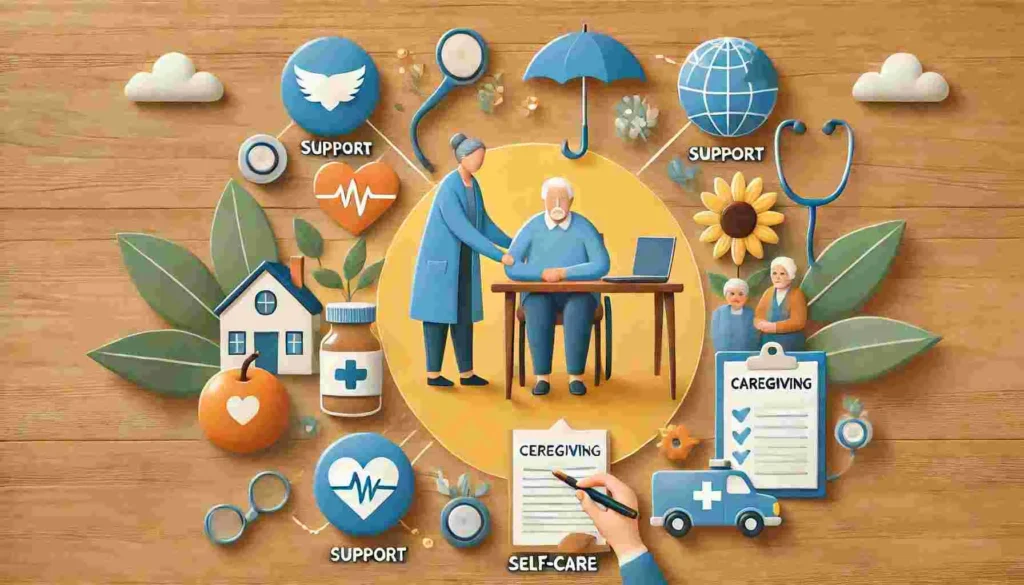
Navigating the Challenges of Caregiving: Support and Self-Care Tips
Navigating the Challenges of Caregiving: Support and Self-Care Tips
Caregiving is one of the most compassionate and demanding roles a person can take on. Whether caring for an elderly parent, a spouse with a chronic illness, or a child with special needs, the responsibilities can be overwhelming. While the love and dedication that come with caregiving are priceless, it often comes at the expense of the caregiver’s well-being. This post explores how to navigate the challenges of caregiving, offering essential support and self-care tips to ensure you can care for your loved one without neglecting your own health.
Understanding the Emotional Challenges of Caregiving
The emotional toll of caregiving is often underappreciated. Caregivers frequently experience a range of emotions, from stress and anxiety to guilt and resentment. These feelings are entirely normal, yet they can be incredibly isolating. Understanding the emotional challenges of caregiving is essential in order to provide the necessary support, both for yourself and for others who may be in a similar situation.
The Weight of Responsibility
One of the most overwhelming aspects of caregiving is the immense responsibility. Caregivers are often the primary decision-makers, overseeing everything from medication schedules to managing daily routines. This responsibility can feel like a heavy burden, particularly when the caregiving demands are constant. Over time, caregivers may begin to feel as though they have no time for themselves, leading to burnout and exhaustion.
Feelings of Guilt
Many caregivers experience guilt, especially if they feel they are not doing enough. This feeling can arise from not meeting expectations (either their own or others’) or simply from not having the time and energy to care for themselves. It’s important to remember that it’s impossible to be everything to everyone. Acknowledge your feelings, but also recognize that your well-being is essential in providing effective care.
Anxiety and Stress
The anxiety of caring for a loved one, particularly when their health is deteriorating, can be overwhelming. The fear of making the wrong decision or worrying about the future is common among caregivers. This stress can have a significant impact on mental health, potentially leading to depression or physical health problems.
Why Self-Care is Essential for Caregivers
Self-care is often the first thing to be sacrificed when caregiving demands increase. However, neglecting your own needs can quickly lead to burnout. To be an effective caregiver, you need to be physically, mentally, and emotionally well. Incorporating self-care into your routine is not a luxury—it’s a necessity.
Setting Boundaries
As a caregiver, setting boundaries is critical. It’s easy to feel guilty for needing time away or for asking for help, but doing so is essential for your mental health. Setting boundaries means knowing when to ask for assistance, when to take a break, and when to say no. These boundaries help prevent burnout and ensure that you can continue to care for your loved one without sacrificing your own health.
Asking for Help
No one can do it all on their own, and caregivers are no exception. Whether it’s a friend, family member, or professional caregiver, asking for help is not a sign of weakness—it’s a sign of strength. Many caregivers feel as though they have to do everything themselves, but involving others in caregiving can provide relief and reduce stress.
Making Time for Yourself
Caregivers often feel that they don’t have the time to engage in activities that bring them joy, relaxation, or personal fulfillment. However, even short periods of time dedicated to personal interests can make a significant difference in your well-being. Whether it’s reading a book, going for a walk, or practicing yoga, making time for yourself is essential for maintaining a balanced life.
Practicing Mindfulness
Mindfulness is a powerful tool for managing stress and anxiety. By focusing on the present moment, caregivers can reduce the overwhelming feelings of stress and worry about the future. Practicing mindfulness through meditation, deep breathing, or simply being present during daily tasks can provide immense relief. Taking just a few minutes each day to focus on your breath or clear your mind can help reduce the emotional load of caregiving.
Support Systems for Caregivers
While self-care is crucial, it’s equally important to have a support system. Navigating caregiving can feel like a lonely journey, but there are numerous resources and support systems available to assist caregivers.
Joining Support Groups
Support groups provide a sense of community and understanding for caregivers. Whether in-person or online, these groups allow caregivers to connect with others who are going through similar experiences. Sharing challenges and successes with others who understand can be therapeutic and empowering.
Professional Counseling
Counseling or therapy can be incredibly beneficial for caregivers. Speaking with a professional allows caregivers to explore their emotions, receive guidance on coping strategies, and address any underlying mental health issues. Therapy provides a safe space to talk openly about feelings of guilt, stress, and frustration.
Respite Care
Respite care provides temporary relief for caregivers, allowing them to take a break from their caregiving responsibilities. This service can be crucial for maintaining your well-being. Respite care can be provided through professional services, or family and friends may offer assistance, allowing caregivers to rest, recharge, and return to their responsibilities with renewed energy.
Practical Caregiving Tips for Managing Daily Tasks
Taking care of a loved one requires organization, patience, and careful attention to detail. The key to managing caregiving responsibilities without feeling overwhelmed is to develop strategies and routines that simplify the process.
Create a Caregiving Plan
A well-organized caregiving plan is essential for managing daily tasks, appointments, and medical needs. A caregiving plan can help you stay on top of responsibilities, track medications, and ensure that nothing falls through the cracks. Start by outlining the basic daily tasks, including meal preparation, hygiene, and medication reminders. Be sure to include your loved one’s medical history, contact information for healthcare providers, and any other important details that could be helpful in an emergency.
Using a digital tool like an app or a spreadsheet can help you track and update caregiving tasks in real-time. This will not only help keep everything organized but also give you peace of mind knowing that you’re staying on top of everything.
Break Down Large Tasks into Manageable Steps
Caregiving can sometimes feel like an endless list of tasks, and it’s easy to become overwhelmed. To avoid burnout, break larger tasks into smaller, more manageable steps. For example, if you need to take your loved one to a doctor’s appointment, don’t think of it as a single task. Instead, break it down into smaller actions such as preparing transportation, gathering medical documents, and arranging post-appointment care.
By focusing on one small task at a time, you reduce the likelihood of feeling overwhelmed and can tackle your caregiving duties with more clarity and efficiency. Keep in mind that it’s okay to ask for help when tasks become too much to handle on your own.
Use Technology for Assistance
Technology can be an invaluable tool for managing caregiving tasks. From medication reminders to scheduling medical appointments, various apps and devices can help make your caregiving role easier. Smart home devices like Alexa or Google Assistant can be used to set reminders, control lights, and even check in on your loved one’s health.
Additionally, health monitoring devices such as wearable fitness trackers can help you keep track of your loved one’s physical activity, sleep patterns, and vital signs. These devices can give you insights into their health and alert you to potential issues, allowing for quicker intervention when needed.
Keep Communication Open
Whether your caregiving responsibilities are shared with other family members or friends, keeping communication open is essential. Regularly check in with your loved one and other caregivers to ensure that everyone is on the same page. This can prevent misunderstandings and ensure that all needs are met.
Establish a system for sharing updates, whether it’s a group chat, email thread, or shared document. This can be especially helpful in managing the care of someone with complex needs, ensuring that everyone involved is aware of the latest changes or decisions.
Time Management for Caregivers: Finding Balance
Time management is one of the biggest challenges faced by caregivers. With so many responsibilities to juggle, it can feel impossible to balance caregiving duties with personal time. However, by employing effective time management strategies, caregivers can ensure that they’re taking care of both their loved ones and themselves.
Prioritize Tasks Based on Urgency
One of the most important time management skills for caregivers is the ability to prioritize. Some caregiving tasks are urgent and must be handled immediately, while others can be postponed or delegated. Begin each day by making a list of tasks and identifying which ones require immediate attention.
For example, feeding and medication are top priorities, while organizing a living space or doing laundry might be tasks you can tackle when there is more time. By prioritizing tasks in this way, you ensure that your loved one’s basic needs are met without feeling overwhelmed by non-urgent responsibilities.
Use a Daily Schedule or Calendar
Caregiving often involves a range of recurring tasks that need to be managed throughout the day. To avoid feeling disorganized or frazzled, consider using a daily schedule or calendar to plan out each day. This can help you break down your caregiving duties and ensure that each task is completed on time.
You can create a physical or digital calendar to keep track of appointments, medication schedules, and any special tasks. Having a visual representation of your day will allow you to see where you have open time slots for personal tasks and rest. It also makes it easier to spot potential conflicts and adjust your schedule accordingly.
Delegate When Possible
As a caregiver, it’s easy to feel like you have to do everything yourself. However, effective time management involves knowing when to delegate tasks to others. If there are other family members or friends who can step in and help, don’t hesitate to ask for assistance. Whether it’s handling grocery shopping, taking over some household chores, or even running errands, delegating tasks can significantly ease your burden and free up more time for self-care.
It’s also important to communicate clearly with anyone you ask for help, ensuring that they know exactly what needs to be done and when. Effective delegation can help you maintain a sense of control while ensuring your loved one’s needs are met.
Allow Time for Breaks and Rest
It’s easy for caregivers to become so focused on the tasks at hand that they neglect their own rest and recovery. However, regular breaks are crucial for maintaining physical and mental health. Schedule small breaks throughout your day, even if it’s just for a few minutes to step outside or enjoy a cup of tea.
Taking time to recharge can help prevent burnout and keep you energized for the next caregiving task. Remember, you cannot provide quality care if you are constantly exhausted.
Self-Care Tips for Caregivers: Nurturing Your Body and Mind
Self-care is not just about taking breaks; it’s about actively nurturing your body and mind to stay balanced and healthy. As a caregiver, you’re often giving so much of yourself to others, but it’s crucial to make time for activities that replenish you.
Maintain a Healthy Diet
It’s easy to let nutrition slip when you’re busy caring for others, but eating a balanced diet is essential for maintaining your energy levels and overall health. Try to prioritize meals that are rich in vitamins, minerals, and protein to keep your body fueled for the demanding role of caregiving.
Consider meal prepping in advance, so you have easy access to healthy meals throughout the week. This reduces the likelihood of reaching for unhealthy snacks or skipping meals due to lack of time.
Exercise Regularly
Exercise is a powerful tool for managing stress and boosting mental clarity. While it may seem impossible to find time for a workout amidst your caregiving responsibilities, even short periods of physical activity can be incredibly beneficial. Whether it’s a 15-minute walk around the block or a brief stretching session, physical activity helps improve mood, increase energy, and reduce stress.
Find small ways to incorporate movement into your day. Take the stairs instead of the elevator, do some light stretching while watching TV, or try a short yoga routine when you wake up. These activities can make a significant difference in how you feel.
Practice Relaxation Techniques
Caring for a loved one can be emotionally and physically taxing. To manage stress, consider incorporating relaxation techniques into your routine. Practices such as meditation, deep breathing, or progressive muscle relaxation can help calm the mind and body, reducing stress levels.
Even just five minutes of deep breathing or mindfulness can make a noticeable difference in your ability to manage the stresses of caregiving.
Long-Term Caregiving: Strategies for Sustaining Care Over Time
Caregiving is not a short-term commitment. Whether you’re caring for a loved one with a chronic illness, advancing age, or a disability, it is essential to have strategies in place to sustain care over the long term. This section will cover how to manage the evolving needs of your loved one, the importance of planning for the future, and how to prevent caregiver fatigue.
Recognize the Changing Needs of Your Loved One
The needs of a person requiring care can change over time. This could be due to the progression of an illness, a change in physical capabilities, or even emotional needs. One of the most important aspects of long-term caregiving is the ability to recognize and adapt to these changes.
Regularly assess the health and well-being of your loved one to ensure that they are receiving the appropriate level of care. Stay in close communication with medical professionals, and don’t be afraid to ask for advice when new needs arise. The more proactive you are, the easier it will be to adjust to changes without becoming overwhelmed.
Plan for Future Care Needs
As a caregiver, it’s vital to plan ahead for the future. This includes researching and understanding any potential future care needs, such as in-home care, assisted living, or long-term care facilities. Preparing in advance can ease the burden when a change is needed, and it ensures that your loved one’s needs are met without disruption.
Create a caregiving plan that includes both short-term and long-term goals. This could involve financial planning, organizing documents related to health care, or setting up appointments with specialists who can provide insight into potential future care needs. Having a clear plan in place will help you make informed decisions when the time comes.
Prevent Caregiver Fatigue and Burnout
Long-term caregiving can be draining, and caregiver burnout is a real concern. It can manifest as physical, emotional, and mental exhaustion. To prevent burnout, it’s crucial to set realistic expectations and understand that it’s okay to ask for help.
One of the most effective ways to manage burnout is through respite care. This allows you to take a break, whether it’s for a few hours or a longer period. Enlist the help of other family members, friends, or hire professional caregivers to provide support when needed.
Another key to managing burnout is staying connected to your own passions and hobbies. Whether it’s reading, cooking, or spending time outdoors, finding joy in activities outside of caregiving will keep your energy levels high and improve your overall mental health.
Navigating Difficult Conversations with Your Loved One
Caregiving is often accompanied by difficult conversations, whether it’s discussing care plans, changes in health, or even end-of-life planning. These discussions can be emotionally charged and challenging for both the caregiver and the person being cared for. However, having open, honest conversations is crucial for ensuring that everyone’s needs are met and that the caregiving process remains smooth.
Talking About Changes in Health or Abilities
As a caregiver, it may be necessary to discuss changes in your loved one’s health or abilities. For example, they may need assistance with basic activities like dressing, bathing, or mobility. This conversation can be difficult, especially if your loved one is resistant to accepting help.
When approaching this topic, it’s important to be sensitive and patient. Use a tone that conveys understanding and empathy. For example, you could say, “I’ve noticed that it’s becoming more difficult for you to do some tasks, and I want to make sure we’re both comfortable. Let’s talk about how we can get you the help you need.”
Allow your loved one to express their thoughts and feelings. Acknowledge their independence, but also gently remind them that accepting help can improve their quality of life. Be patient, and allow them to adjust to the idea at their own pace.
Discussing End-of-Life Care
End-of-life care is another sensitive topic that caregivers must navigate. It can be one of the most challenging conversations, especially if it involves making difficult decisions about hospice care, advanced directives, or living wills.
While this conversation may not be easy, it’s important to have it as early as possible. Approach it with compassion, acknowledging your loved one’s feelings and preferences. Let them know that the goal is to honor their wishes and provide them with the best possible care.
Consider involving a medical professional, such as a palliative care provider or hospice nurse, in these conversations. They can offer guidance on treatment options and provide additional resources to help you and your loved one make informed decisions.
Involving Other Family Members in the Conversation
When caregiving responsibilities are shared among family members, it’s essential to keep the lines of communication open. If multiple family members are involved in the caregiving process, discussing responsibilities, expectations, and concerns is key to avoiding misunderstandings and resentment.
Hold regular family meetings to check in on how the caregiving process is going. Share updates on your loved one’s health and discuss any challenges or concerns that may have arisen. It’s also important to talk about the division of caregiving tasks and ensure that everyone is contributing and being supported.
The Importance of Resilience in Caregiving
Caregiving can be a difficult and exhausting journey, but resilience is one of the most important traits you can cultivate. The ability to bounce back from challenges, stay positive, and maintain a sense of hope and purpose will help you navigate even the toughest days.
Develop Emotional Resilience
Emotional resilience involves the ability to cope with stress, adversity, and difficult emotions. As a caregiver, there will be days when you feel overwhelmed, frustrated, or helpless. These feelings are natural, but it’s important not to let them define your caregiving experience.
One way to build emotional resilience is by practicing mindfulness and gratitude. Take time each day to reflect on the positive aspects of caregiving, such as the moments of connection and love you share with your loved one. Recognizing the small victories and taking pride in the care you provide will help you stay focused on the bigger picture.
Find Support from Others
As previously mentioned, caregiving can be an isolating experience. It’s important to surround yourself with a strong support system. Seek out other caregivers, join online communities, or attend local support groups to connect with others who understand what you’re going through.
Remember, you are not alone. By leaning on others and allowing yourself to share your struggles, you’ll be better equipped to cope with the challenges of caregiving. Support groups provide emotional validation, coping strategies, and practical tips to help you feel empowered in your role.
Stay Hopeful
Maintaining hope is one of the most powerful ways to remain resilient. While caregiving can sometimes feel like an endless cycle of challenges, try to focus on the positive aspects of the journey. Reflect on the joy and love you bring to your loved one’s life, and remember that you are making a significant difference in their well-being.
Whether through spiritual practices, personal beliefs, or simply staying connected to your loved one’s progress, holding onto hope will help you navigate the ups and downs of caregiving with strength and dignity.



